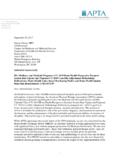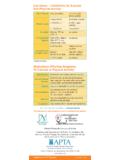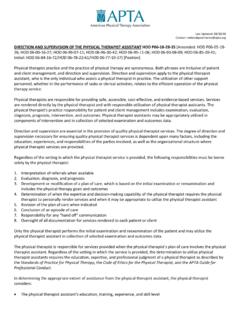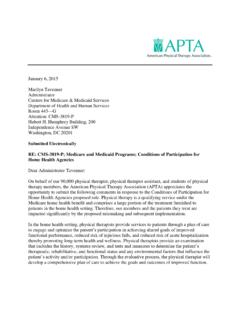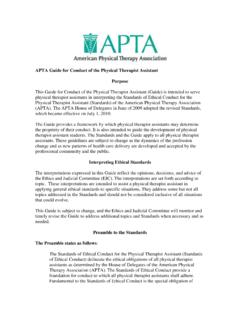Transcription of APTA e-Letterhead color
1 September 6, 2016. Andy Slavitt Acting Administrator Centers for Medicare & Medicaid Services Department of Health and Human Services 7500 Security Boulevard Baltimore, MD 21244 1850. Submitted Electronically Re: File Code-CMS-1654-P; Medicare Program; Revisions to Payment Policies under the Physician Fee Schedule and Other Revisions to Part B for CY 2017; Medicare Advantage Pricing Data Release; Medicare Advantage and Part D Medical Low Ratio Data Release; Medicare Advantage Provider Network Requirements; Expansion of Medicare Diabetes Prevention Program Model; Proposed Rule Dear Acting Administrator Slavitt: On behalf of our 93,000 member physical therapists, physical therapist assistants, and students of physical therapy, the American Physical Therapy Association ( apta ) is pleased to submit comments on the Centers for Medicare and Medicaid Services (CMS).
2 Proposed rule regarding Medicare Program; Revisions to Payment Policies Under the Physician Fee Schedule and Other Revisions to Part B for CY 2017, published in the July 15, 2016, Federal Register. apta 's goal is to foster advancements in physical therapy practice, research, and education. The mission of apta is to further the profession's role in the prevention, diagnosis, and treatment of movement dysfunctions and the enhancement of the physical health and functional abilities of members of the public. The physician fee schedule is currently the basis of payment for outpatient therapy services furnished by therapists in private practice as well as outpatient therapy services furnished by hospitals, outpatient rehabilitation facilities, public health agencies, clinics, skilled nursing facilities, home health agencies, and comprehensive outpatient rehabilitation facilities.
3 Therefore, any changes to payments under the physician fee schedule for outpatient therapy services have a significant and direct effect on Medicare payments across the entire spectrum of the therapy delivery system. apta is committed to being a vested partner with the Department of Health and Human Services (HHS) as it moves swiftly toward its goal of shifting from Medicare payment based solely on fee for service to a value-based payment system. To that end, apta has put significant resources into collecting data to aggregate and analyze the impact of physical therapy, as well as to overhaul the current coding structure. We wholeheartedly support the concepts presented in this proposed rule, such as initiatives to improve pricing and increase transparency, but we do have serious concerns about the manner in which these proposals are being carried out.
4 Therefore, we strongly urge CMS to consider and adopt apta 's recommendations as articulated below. Recommendations 1) apta urges CMS to exercise its discretionary authority under 1115A of the Social Security Act to allow physical therapists to perform telehealth services while participating in alternative payment models such as the Medicare Shared Savings Program and the Comprehensive Care Joint Replacement Bundled Payment Model. 2) apta strongly urges CMS to reverse its current proposal and adopt the original proposal submitted by the American Medical Association Relative Update Committee's Health Care Professionals Advisory Committee for the stratified payment level for physical therapy evaluations and reevaluation.
5 In addition, we strongly urge the agency to delay the development of any payment adjustments as a result of analyzed claims data during CY 2017 after the implementation of the stratified code descriptors until a full analysis can be completed in partnership with apta and other stakeholders. 3) apta requests that CMS allow the requisite time for apta to work through the AMA RUC process to survey and valuate the physical therapy codes identified on the potentially misvalued codes list, as we are committed to working through that process in an expeditious manner starting this fall. apta would appreciate the opportunity to discuss our progress with CMS at the beginning of next year prior to the publication of the 2018 physician fee schedule proposed rule.
6 4) apta supports the release of Medicare Advantage (MA) pricing and medical low ratio data, and urges CMS to take the requisite additional steps to hold MA plans accountable for the implementation of appropriate payment policies. 5) If CMS decides to require MA providers and suppliers to be enrolled in Medicare in an approved status, then apta would ask that CMS extend the timeline for implementation of this regulation. The proposed rule sets the effective date as the first day of the next plan year that begins 2 years from the publication of the CY. 2017 physician fee schedule final rule with comment period. We recommend that CMS extend the implementation period another 2 years.
7 6) apta supports the expansion of the Diabetes Prevention Program and urges CMS. to clarify the critical role that physical therapists will play in this program, especially in home and community-based settings. 7) apta strongly supports initiatives to improve the safety and quality of patient care, and is a vested partner with HHS in increasing participation in Medicare value-based payment models including alternative payment models and accountable care organizations (ACOs). apta recommends that CMS consider adding measures that capture patient function to the ACO quality-reporting program in the future. We encourage CMS to work with relevant stakeholders to implement more measures of patient function into quality-reporting programs.
8 8) apta urges the Secretary of HHS to exercise its given authority to add physical therapy as a nonqualifying designated health service that cannot be furnished to Medicare patients under the in-office ancillary services exception of the physician self-referral laws. Our comments on each of these recommendations are discussed in further detail in the following paragraphs. Medicare Telehealth Services In 2015, CMS received a request to add the following services as Medicare telehealth services for calendar year 2017: Physical and Occupational Therapy and Speech- Language Pathology Services CPT codes 95207-08, 92521-24, 92526, 92610, 97001-04, 97110, 97112, 97116, 97532, 97533, 97535, 97537, 97542, 97550, 97555, and 97660-02.
9 CMS has decided not to add these codes as Medicare telehealth services. CMS states that physical therapists are not authorized practitioners of telehealth services as defined by statute. Therefore, CMS rejects the requester's contention that the agency can add practitioner types to the definition without legislation. apta appreciates this clarification of the agency's statutory authority under 1834(m) of the Social Security Act. apta strongly believes that allowing providers such as physical therapists to provide telehealth services under Medicare will help reduce health care expenditures, increase access to care, and improve a provider's ability to manage chronic disease in rural and underserved areas.
10 As telehealth technology continues to improve, it is essential that physical therapists are afforded the appropriate legal and regulatory opportunities to treat patients cost effectively while preserving high standards of care. To that end, apta has been steadfast in our advocacy efforts for the passage of the Medicare Telehealth Parity Act ( 2948), introduced by Reps Thompson (D CA) and Harper (R MS), which would add physical therapists and several other therapy provider groups to the list of authorized telehealth providers under Medicare. apta will continue to work with Congress to secure the appropriate statutory language, but in the interim we urge CMS to exercise its discretionary authority under 1115A of the Social Security Act to allow physical therapists to perform telehealth services while participating in alternative payment models such as the Medicare Shared Savings Program (MSSP) and the Comprehensive Care Joint Replacement Bundled Payment Model (CJR).
